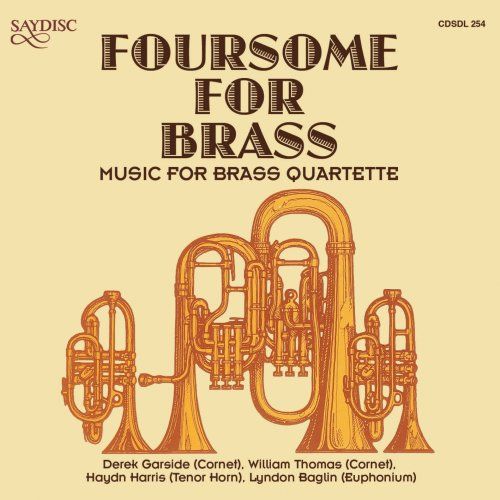

This reissue CD of an original LP recording made in 1974 is a timely reminder of the art of brass band quartet playing.
And something of a lost art at that.
Once a staple competitive element of the movement, it has become an archaic curio; young players and composers (with the exception of some at conservatoires and colleges) seemingly no longer interested in exploring, let alone mastering its very specific musical challenges.
Oddly for a genre that still offers lucrative prize money and performance opportunities, even the majority of older brass band players are increasingly ignorant to its delights.
This release may well persuade them otherwise.
Mature performers
At the time of the recording these were mature performers; each confident in their own as well as their colleague’s abilities.
Derek Garside had progressed from being revered as one of the finest cornetists of his generation to become Musical Director of the CWS (Manchester) Band, whilst Haydn Harris (who died in 2020) was still its much admired solo horn.
Those layers of experience and ‘know-how’ are evident; the playing a mix of the strident and studied, spot-lit and osmotic - all imbued with style (although very much of its time in places), detail, precision and balance throughout.
Lyndon Baglin was the peerless solo euphonium at the Stanshawe Band in Bristol, where former Welsh Guards bandsman David Thomas was the highly respected principal cornet.
Those layers of experience and ‘know-how’ are evident; the playing a mix of the strident and studied, spot-lit and osmotic - all imbued with style (although very much of its time in places), detail, precision and balance throughout.
Always balance.
Bridge players
Garside’s virtuosic brilliance sits on his colleague’s richer, tempered cornet tonality, the horn acting as a malleable buffer linking the sonority of the euphonium.
What stands out though is the phrasing and shaping of individual and communal musical lines; an intuitive understanding of just when and how to show, compliment, taper and mould; like experienced Bridge players revealing but never overstating their hands.
Carnelian
The repertoire (which sadly lacks sleeve notes) - especially Spurgin’s bold ‘Foursome for Brass’ alongside Vinter’s ‘Fancy’s Knell’ (with its close harmonic structures echoing elements of ‘Triumphant Rhapsody’) - and ‘Alla Burlesca’, hold their timeless appeal.
William Rimmer’s romanticised ‘Concordia’ is a carnelian coloured miniature tone-poem, whilst Ord-Hume’s ‘Butterfly Caprice’ flutters brightly, if briefly by. Pinsuti’s ‘Good Night Beloved’ is straight out of the late Victorian parlour song book.
All this and the cameo portraits from Alex Mortimer, Bishop and Richardson are perfectly executed; embossed with the hallmarks of the performer’s self-evident and thoroughly persuasive quality.
Iwan Fox
To purchase: https://www.wyastone.co.uk/foursome-for-brass.html
Play list:
1. Foursome for Brass (Anthony Spurgin)
2. An Eriskay Love Lilt (arr. Alex Mortimer)
3. Fancy’s Knell (Gilbert Vinter)
4. Mary (Richardson)
5. Foresters Sound the Cheerful Horn (Bishop)
6. Concordia (William Rimmer)
7. Butterfly Caprice (Ord-Hume)
8. Alla Burlesca (Gilbert Vinter)
9. Good Night Beloved (Ciro Pinsuti)









